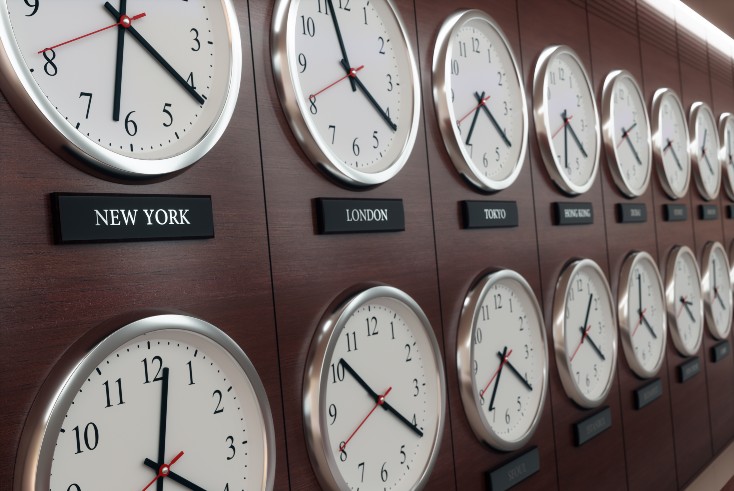An Englishman in New York: The business of time zones

Opinion
Managing the time difference is one of the most difficult parts of moving from the UK to the US. Doing so requires strategy and rule-setting.
Last week, Cannes Lions hosted our flagship industry festival and it’s a time when many across the world gathered around the Croissette. In doing this trip, many felt jet-lagged and struggled with the time zone (i.e., when to call home, when to check in with colleagues, what the hell is going on in local news, etc.), so I wanted to use my column to expand on the “business of time zones”.
When I first started my career in London, we used to joke about how slow DFA (an early Google ad server) would be at 1pm as “the Americans came online”. I’d also hear from UK salespeople who had US bosses (this is quite common in adtech) how difficult afternoons could be as emails started to fly around and the Americans have just had their early-morning coffee.
Now that I live on the other side of the pond, I am experiencing what it’s like being in a “behind” time zone (New York is five hours behind London), and, to be honest, it’s been the most difficult part of moving. By a long way.
The ‘business time zone’ is different from the ‘actual time zone’
Anyone who has worked with me knows that I like to start early; I like to get ahead of the crowd (literally, when I commuted on the Northern Line for 10 years) and get ahead of the day. When you’re five hours behind where most of your work is conducted, getting ahead is nearly impossible. It can be overwhelming when you wake up at 6am to a multitude of WhatsApp messages, emails and missed calls that have gathered overnight — some very urgent and stressful. It doesn’t start your day off well.
It can also be difficult on a personal level. You have a quick look at Instagram, and you see your friends grabbing a pint or they’re out and about enjoying themselves, and you’ve still got the rest of the afternoon’s work ahead of you. Then, at night, when 95% of my friends and family are asleep, my phone and emails are completely still. Most of the time this is nice as I can enjoy down time, but sometimes it’s a bit unnerving.
I feel like saying “the business time zone is different from the actual time zone” is one of those cringey things you hear from “influencers” on Twitter, but let me explain:
If I started my day at 8am in New York, that’d be 1pm in London — that’s when I’d expect my team to be out for a lunchtime walk or grabbing some food. If I start at 9am, there’s only three-and-a-half hours of work time with my UK team (as I never want them to work late).
It can also be challenging as a business owner if you need to check in on a client paying their invoice on time. Some clients will go out of the way to make the process difficult anyway, let alone getting a chase later in the day that they can put off.
Where I’m getting to is that if you are located in the US but deliver work in the UK, you need to start your day exceptionally early. This has ramifications on things like routine and sleep, which impact physical and mental health as disrupted routine is proven to make people unwell.
The solution: you need to put rules in place
When I first moved, I’d literally spend hours on my phone first thing in the morning before even leaving the apartment or having breakfast.
I’m still a “get ahead of the day” person, so I wake up exceptionally early, but I’ve found ways to better use that time in the morning than just answering slack or emails on my phone on the sofa. I also won’t take calls before a certain time unless incredibly important, as if I’m presenting at 7:30am, for example, I get to lunch and have used up most of my energy for the day! It’s then not healthy to run on coffee, sweets and whatever else to push through the afternoon.
I feel like time zones are not discussed often enough in our global industry. People are constantly having to fit their lives around the time of day and that has significant impact. However, if people can recognise it, they can then try to adapt their plans around it.
Re-reading this column back, maybe what I have said seems obvious, but it’s been very disruptive in my life over the past three years and something which everyone in the world, when dealing with someone in a different country, should be cognisant of.
Oh, and, when you’re in Los Angeles, some friendly advice: don’t ask the person in Delhi to dial in for an 11am local time call…
 Wayne Blodwell is founder of TPA Digital, an online advertising consultancy. ‘An Englishman in New York’ is a monthly column reflecting on time setting up a business in the US and what media Brits should know when deciding to find success stateside.
Wayne Blodwell is founder of TPA Digital, an online advertising consultancy. ‘An Englishman in New York’ is a monthly column reflecting on time setting up a business in the US and what media Brits should know when deciding to find success stateside.




